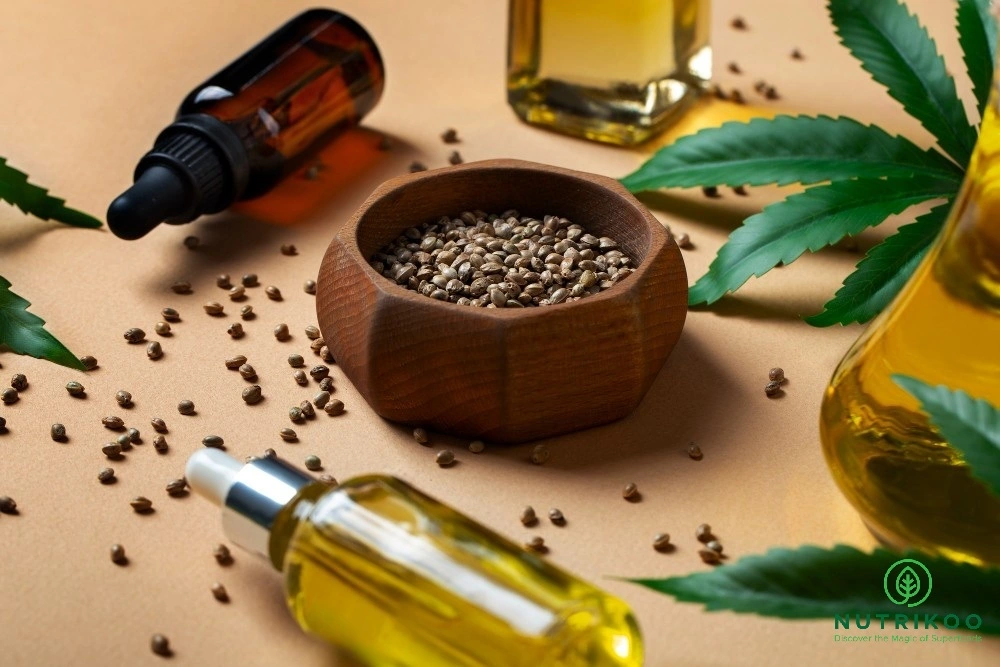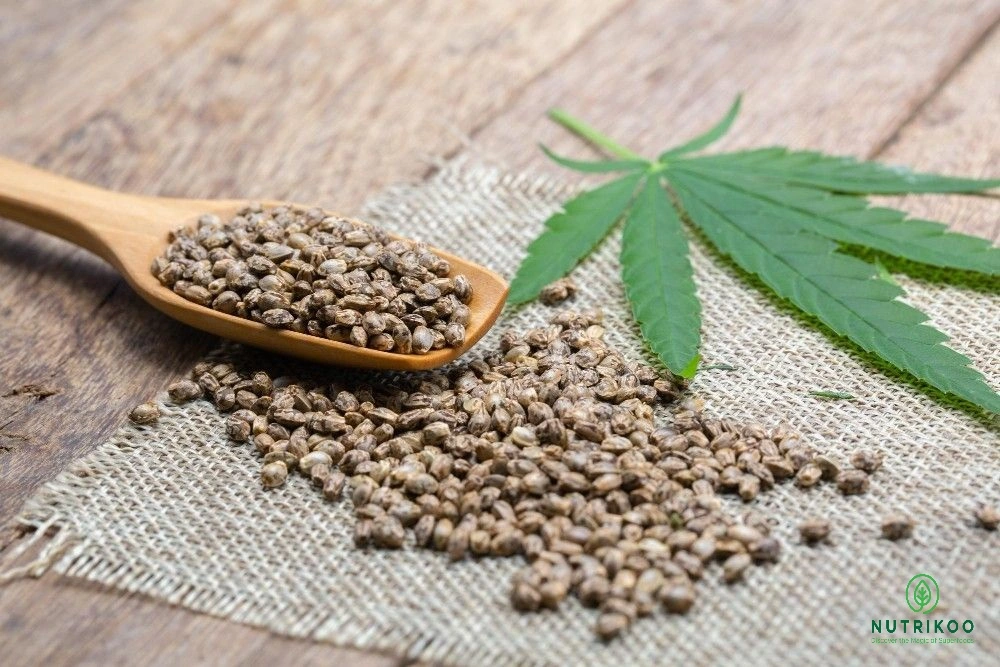The soft rustle of a morning breeze sweeps through the green fields as sunlight kisses the delicate leaves of Cannabis sativa. Among these humble plants grow tiny, oval-shaped seeds—Hemp Seeds—a gift from nature that’s been misunderstood, rediscovered, and now celebrated for its powerful health benefits. Once part of ancient rituals and royal diets, these seeds are reclaiming their rightful place in modern kitchens and wellness circles around the world.

🌍 Origin and Different Names of Hemp Seeds
Hemp seeds, scientifically known as Cannabis sativa L., have a rich and complex history. Despite sharing the same plant family as marijuana, hemp is a non-psychoactive variety, cultivated primarily for its seeds, oil, and fibers.
Different Names Across the World:
- Hindi: Bhang ke beej / Vijaya beej
- English: Hemp seeds
- Scientific Name: Cannabis sativa L.
- Sanskrit: Vijaya, Siddhi, Madana
- Chinese: Ma zi
- Arabic: Shayf al-kanabis
- Other Regional Names: Industrial hemp, True hemp, and in some cultures simply “super seed.”
The history of hemp dates back over 10,000 years, making it one of the oldest cultivated crops known to humankind. Ancient Chinese records mention hemp as a food and medicine as early as 2800 BCE. It was used by Egyptians, Persians, and Indians—not only as nourishment but as a textile fiber and sacred herb. In India, references to hemp (Vijaya) appear in Atharva Veda, where it was revered as one of the five sacred plants.
🌱 Types of Hemp Seeds
There are mainly three forms of hemp seeds available in the market today:
- Whole Hemp Seeds:
These are the seeds with their outer shells intact, rich in fiber and crunch. They are often roasted or used in cereals and granola mixes. - Hulled Hemp Seeds (Hemp Hearts):
The most commonly consumed type, these are de-shelled seeds that are soft, nutty, and easy to digest. - Hemp Seed Oil and Protein Powder:
Derived from the seeds, these forms are used for culinary, cosmetic, and nutritional purposes, providing omega-rich oil and high-quality plant protein.
💚 Health Benefits of Hemp Seeds
Hemp seeds are often called a “perfect protein”—and for good reason. They contain all nine essential amino acids, making them a complete source of plant protein, ideal for vegans and vegetarians. Beyond protein, they offer a powerful blend of healthy fats, vitamins, and minerals that nourish the body in countless ways.
1. Supports Heart Health
Hemp seeds are packed with omega-3 and omega-6 fatty acids in an optimal 3:1 ratio, known to reduce cholesterol levels and maintain healthy blood pressure. The amino acid arginine promotes nitric oxide production, improving circulation and reducing heart disease risk.
2. Improves Skin and Hair Health
The same essential fatty acids that benefit the heart also enhance skin elasticity and hydration. Hemp oil is often used in skincare for eczema, dryness, and acne due to its anti-inflammatory properties.
3. Aids Digestion
Whole hemp seeds, with their fiber-rich shells, promote healthy digestion and regular bowel movement. The soluble and insoluble fibers together act as a natural prebiotic, supporting gut health.
4. Boosts Immunity and Energy
Rich in essential nutrients like vitamin E, magnesium, and zinc, hemp seeds strengthen the immune system. The balance of fats, protein, and fiber helps maintain sustained energy throughout the day.
5. Promotes Muscle Growth and Recovery
Hemp protein is a favorite among athletes for its high digestibility and amino acid profile. It aids in muscle repair post-workout without the heaviness of dairy-based protein powders.
⚖️ Harms and Side Effects
While hemp seeds are generally safe and beneficial, moderation is key. Excess consumption or certain conditions may lead to:
- Digestive Discomfort:
Overeating can cause bloating or diarrhea due to its high fiber content. - Interaction with Medications:
People on blood thinners should consult a doctor before consuming hemp oil, as omega fatty acids can slightly thin the blood. - Allergic Reactions:
Rare but possible in those sensitive to hemp proteins. - Misunderstanding with Marijuana:
Though hemp seeds contain negligible THC (the psychoactive compound), confusion about legality still exists in some countries.
⚖️ Pros and Cons of Hemp Seeds
| Pros | Cons |
|---|---|
| High in complete protein | May cause mild digestive issues in excess |
| Excellent source of healthy fats | Confusion over legality in some areas |
| Rich in vitamins and minerals | Expensive compared to common seeds |
| Vegan and gluten-free | Requires proper storage to prevent rancidity |
| Good for heart, skin, and immunity | May interact with certain medications |
⚖️ Legal Status: Is Hemp Seed Legal?
The legality of hemp seeds varies by country, but the global view is shifting rapidly.
- In India: Hemp seeds and hemp-based food products are legal, as they contain no psychoactive THC. However, growing hemp without government permission is restricted under the Narcotic Drugs and Psychotropic Substances (NDPS) Act.
- In the USA and Europe: Hemp cultivation and seeds are legal, provided THC content is below 0.3%.
- In Canada, Australia, and parts of Asia: Hemp seeds are recognized as a nutritional food supplement.
So yes, hemp seeds are legal to consume in most parts of the world today.
🌾 Uses of Hemp Seeds
Hemp seeds have a versatile presence in both culinary and wellness industries.
🍴 Culinary Uses:
- Sprinkle over salads, smoothies, or oatmeal.
- Add to protein bars, granola, or desserts.
- Use hemp oil for salad dressings or cold recipes.
- Mix hemp protein powder into shakes for a post-workout boost.
🧴 Industrial and Cosmetic Uses:
- Used in cosmetic oils, lotions, and soaps for skin nourishment.
- Used in biodegradable plastics, ropes, and textiles—hemp fiber is known for its strength and durability.
🌿 Hemp Seeds in Ayurveda
In Ayurveda, hemp (Vijaya) holds a special and sacred position. It is mentioned in ancient texts for its therapeutic balance of Vata and Kapha doshas. Ayurvedic practitioners have long used hemp seeds and leaves for:
- Improving digestion (Agni vardhak)
- Reducing inflammation and pain (Shoolahara)
- Balancing the mind and body (Medhya rasayana)
- *Promoting sleep and relaxation
Hemp seed oil is also used in Ayurvedic massage therapy (Abhyanga) for soothing the nerves and moisturizing the skin.
However, Ayurveda always emphasizes dosage and purity, warning that excess can lead to lethargy or mental dullness.
📊 Nutritional Value of Hemp Seeds (Per Gram)
| Nutrient | Value (per gram) |
|---|---|
| Protein | 0.33 g |
| Fat (Healthy Fats: Omega-3 & 6) | 0.49 g |
| Carbohydrates | 0.08 g |
| Fiber | 0.04 g |
| Calories | 5.5 kcal |
Note: These values may vary slightly depending on the processing and origin.
🌸 Beautiful Summary
From ancient temples to modern health stores, Hemp Seeds have traveled a long road—rediscovered, revalued, and revered once again. Once misunderstood due to their link with cannabis, these tiny seeds are now celebrated for what they truly are: a natural superfood brimming with life, balance, and nourishment.
They bridge the wisdom of Ayurveda and the precision of modern nutrition. Whether you’re stirring them into your morning smoothie, sprinkling them on salads, or using their oil for glowing skin, hemp seeds quietly work to heal from within.
In every spoonful lies a story of nature’s resilience—a seed that endured stigma, only to bloom again as a symbol of health, harmony, and holistic living.

